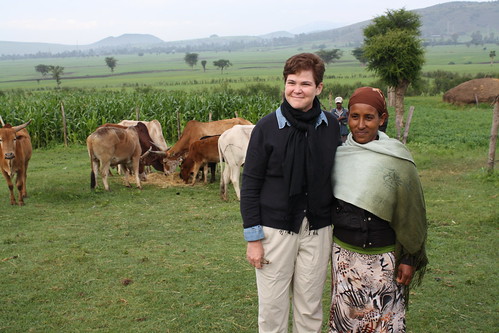
On a recent trip to Africa, I spent time in Ethiopia witnessing how USDA’s work there is helping the country’s agricultural sector to grow and thrive, especially for women farmers.
I visited a small-scale, woman-owned dairy farm near the town of Mojo, about 50 miles south of Addis Ababa, to see how the Feed Enhancement for Ethiopian Development (FEED) project, an activity supported by USDA’s Food for Progress program, has boosted milk production through better feeding practices and farm management.
The owner, a wonderful young woman named Yetemwork Tilahun, gave me a personal tour of her operation. I saw firsthand, the positive impact the FEED project has had in improving milk production and generating an alternative revenue stream for Yetemwork and her hardworking family. It was clear to me that her determination and commitment to maintain healthy and productive animals has been an important part of her success.
The Food for Progress program, administered by USDA’s Foreign Agricultural Service, helps developing countries modernize and strengthen their agricultural sectors. USDA has partnered with ACDI/VOCA to carry out the FEED project in Ethiopia.
Yetemwork expressed her gratitude for USDA’s support through the FEED project. She’s been able to expand her operation from a single dairy cow to a current herd of 10 crossbred Holsteins, each valued at about $3,000 (USD). She’s now able to provide her family with fresh milk, while generating extra income by selling surplus production to several restaurants and hotels, as well as the nearby cooperative. Yetemwork is also growing teff – Ethiopia’s staple grain –on the farm. She uses the teff to make injera (traditional Ethiopian bread), for her family and sells the surplus grain in the local market.
Yetemwork’s success is also helping the neighboring community. She now employs seven outside hands to help with the increased workload. Her 11-year-old son also helps out around the farm and she hopes that he will become a large-scale farmer when he grows up. Her husband handles the milk sales and is also responsible for purchasing the feed ingredients from the local cooperative.
It was exciting to see that the farm is largely self-sustaining, growing its own forage for its dairy and beef animals with the help of the FEED program. Yetemwork has developed a biogas unit where she composts the livestock waste from her farm to power her home. I was also delighted to learn that the FEED program has positioned Yetemwork’s farm as the model that other local dairy owners want to emulate.
I’m inspired by the growing number of strong, dedicated women around the world who, like Yetemwork, are pursuing careers in agriculture. USDA will continue to support programs that create new opportunities to help all farmers and ranchers grow their businesses and foster economic growth worldwide.

